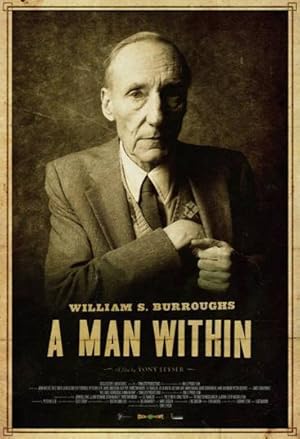
William S. Burroughs: A Man Within Page #2
and everything.
You know, you see a movie
like Blade Runner,
and then you find the phrase
"blade runner" came from him.
The term "heavy metal"
is attributed to him.
"Soft machine."
You know, there's so many
phrases, names of groups that
come from William's work.
He's like another kind of Bible.
[ Victor Bockris ]
He's a great pioneer of
the gay liberation movement,
or the whole position,
standing of gay people
around the world really now.
Where'd you learn about sex
originally, from friends?
Books.
Books? Yes.
The book called The Plastic Age
by Percy Marks was sort of
a daring book for the '20s.
Mm-hmm.
And The Green Hat
and Coming of Age in Samoa.
Mm-hmm.
This is the '20s
I'm talking about,
which is a very different era.
[ Bockris ]
Burroughs once said to me,
"If one man stands up
and, you know, rejects..."
the bullshit of society,
"it makes it possible for
everyone else to follow on."
And he was that man
to some extent.
And here is Reverend Braswell
in the Denver Post...
"Homosexuality is
an abomination to God..."
and should never
be recognized...
as a legal human right any more
than robbery or murder.
At the present time
in Colorado where
this was written,
approximate
MOB conditions prevail.
And by MOB,
I mean 'My Own Business.'
No sex crimes on the book.
You can f*** a cow right
in front of the sheriff,
and all he can say is 'Moo!'
But you can hardly expect
to bring down the barn
with an act like that.
With the right virus offset,
perhaps we can get this whole
show out of the barnyard
and into space.
"This is the space age,
and we are here to go."
They asked him at a press
conference what he thought
of the gay rights movement.
And his response was,
"I have never been gay
a day in my life,
and I'm sure as hell
not part of any movement."
But Burroughs
was a deconstructor of labels.
You know,
that was just another sort of
amalgalmized effort to, uh...
to not be marginalized.
And he was
one of the very few...
maybe Jean Genet
and maybe Pier Paolo Pasolini...
who had the balls...
way before it was, like, vogue,
and certainly
when it was dangerous,
to say "I'm queer."
But he was way beyond that,
because he didn't respect any
of the rules of the gay world
at all either.
He was hardly
a Boys in the Band.
That culture would have been
very foreign to him because
there were so many rules.
There were so many rules
in the straight world too.
And he violated the rules
of even junkies' worlds.
He opened up to me
not gay culture.
couldn't fit in gay culture.
Very different.
And I have to say that
Burroughs to this day
and his work...
have an uneasy, uh,
relationship with
"queer culture in America."
Or queer writing or whatever.
Burroughs was never seen
as part of that.
He was still too transgressive.
Even when it became
sort of okay to be queer,
he was beyond queer.
[ Andy Warhol ]
On this thing right here.
Right here. Here. Go on...
Oh, my God.
[ Bockris ] And I have to take
Burroughs and Warhol
as parallel figures.
Two people who,
in the late '50s
and early '60s,
stood up for
what they believed in.
Made no pretense about it.
Were totally out front about it.
At that time, that was
absolutely outrageous.
I mean, it's hard for people
who didn't live in those times
to know.
When I moved to America
in 1965,
you could not mention
the word "homosexuality"...
without everyone thinking
you were gay.
And it was really
just verboten.
And it's because of Burroughs
and Warhol and what followed
in their wake...
that the whole gay liberation
movement sprung up.
[ James Grauerholz ]
William's boyfriends were
a series of obsessions,
usually more or less foredoomed.
Well, first of all, his cousin,
Prynne Hoxie in St. Louis,
who went off to a different
university, Princeton,
and then died
a year and a half later...
in a drunken accident
in New York.
He was decapitated by...
a tunnel.
And then
he fell in love with a boy
at Los Alamos Ranch School.
And there was a big disgrace,
and little Billy ran away home
to St. Louis...
and couldn't go back
Los Alamos at all.
Sent off for his diaries.
And as he wrote,
when the box arrived with
the fearful diaries in them,
he couldn't wait to rip it open
and make sure he could destroy
the offending pages.
Some of these things
were examples of how
he had tried to write...
and why he had given up.
He says, "Fact is,
I had gotten a 'sickener.'"
Meaning like a jail sentence.
I mean, his boyfriends
like Jack Anderson,
the one that he cut
his finger off over...
and who helped him wreck
the family car.
Lewis Marker, the American
student at Mexico City College,
who was probably pretty
good intellectual company,
but was not gonna commit
his life to Bill Burroughs.
So he very much was thinking
of boyfriends as members of
a class different from him.
After I had lived with William
for several weeks...
and then began my relationship
with Richard Elovich,
my first lover,
I remember William
commenting once,
"See, you and Richard,
you have this idea
about, uh,
intellectual and social equals
being a couple."
He says, "In my day,
that's just unheard of."
I mean, you know,
it was an interclass thing."
[ Marcus Ewert ]
In the fall of '89,
I met him at his old place...
his old stomping grounds
in the Bowery... the Bunker.
And at that time, I was 18.
I was a freshman in college.
I was already basically
Allen Ginsberg's boyfriend.
Um, but I always kind of planned
out that I would still hook up
with William...
when and if the opportunity
presented itself.
Were you sexually interested
in me at that time?
Uh, I don't...
Not particularly.
Because I don't
remember any...
I don't remember any, um...
any such thing.
Mm-hmm.
How come?
'Cause I was kind of cute.
Looking back
with hindsight.
Well, I don't know.
If it was
like an ordinary
relationship...
in one of his novels,
it was usually
the theme
of, um,
chasing after somebody
that didn't quite...
want to have anything
to do with...
the author of
what you were reading.
Which was, I think in Queer,
something that was shown
like what his writings
were for.
They were love letters
to make the person that
he was interested in laugh.
'Cause they were
almost comedy routines.
[ Genesis Breyer P-Orridge ]
In a way, he was somebody who
appeared to be incredibly sad...
to me as time went by.
Someone who'd been hurt.
For example, you read...
that William was crazy in love
with Allen Ginsberg...
and that it was almost always
an unrequited passion.
And I think that that
disappointment that he had...
when he did fall in love,
which was so rare for him,
made him a lot
more withdrawn...
sexually and emotionally.
A lot more afraid of being
vulnerable and then being hurt.
So he started to close down
Translation
Translate and read this script in other languages:
Select another language:
- - Select -
- 简体中文 (Chinese - Simplified)
- 繁體中文 (Chinese - Traditional)
- Español (Spanish)
- Esperanto (Esperanto)
- 日本語 (Japanese)
- Português (Portuguese)
- Deutsch (German)
- العربية (Arabic)
- Français (French)
- Русский (Russian)
- ಕನ್ನಡ (Kannada)
- 한국어 (Korean)
- עברית (Hebrew)
- Gaeilge (Irish)
- Українська (Ukrainian)
- اردو (Urdu)
- Magyar (Hungarian)
- मानक हिन्दी (Hindi)
- Indonesia (Indonesian)
- Italiano (Italian)
- தமிழ் (Tamil)
- Türkçe (Turkish)
- తెలుగు (Telugu)
- ภาษาไทย (Thai)
- Tiếng Việt (Vietnamese)
- Čeština (Czech)
- Polski (Polish)
- Bahasa Indonesia (Indonesian)
- Românește (Romanian)
- Nederlands (Dutch)
- Ελληνικά (Greek)
- Latinum (Latin)
- Svenska (Swedish)
- Dansk (Danish)
- Suomi (Finnish)
- فارسی (Persian)
- ייִדיש (Yiddish)
- հայերեն (Armenian)
- Norsk (Norwegian)
- English (English)
Citation
Use the citation below to add this screenplay to your bibliography:
Style:MLAChicagoAPA
"William S. Burroughs: A Man Within" Scripts.com. STANDS4 LLC, 2025. Web. 21 Jan. 2025. <https://www.scripts.com/script/william_s._burroughs:_a_man_within_23498>.



Discuss this script with the community:
Report Comment
We're doing our best to make sure our content is useful, accurate and safe.
If by any chance you spot an inappropriate comment while navigating through our website please use this form to let us know, and we'll take care of it shortly.
Attachment
You need to be logged in to favorite.
Log In